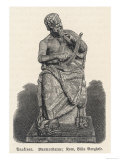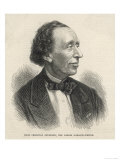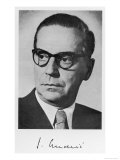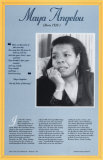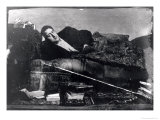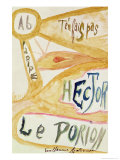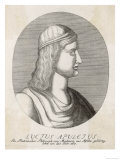|
|
|
|
|
|
|
|
Hans Christian Andersen
b. 4-2-1805; Odense, Denmark
d. 8-4-1875
The Emperor's New Suit - “Why, but he hasn't got anything on!” they all shouted at last. And the emperor winced, for he felt they were right. But he thought to himself: “I must go through with the procession now.” And he drew himself up more proudly than ever, while the chamberlains walked behind him, bearing the train that wasn't there.
• more Hans Christian Andersen posters
• more Classic Children's Authors posters
|
|
|
|
Maxwell Anderson
b. 12-15-1888; Atlantic, Pennsylvania
d. 2-28-1959; Stamford, CT
Maxwell Anderson, a playwright, author, poet, journalist and lyricist, was brought up in Jamestown, North Dakota. Many of Anderson's plays focused on liberty and justice; he was fired from several positions (once as a high school teacher in ND for making pacifist statements).
Among Anderson's familiar works are Anne of the Thousand Days about Anne Boleyn and Henry VIII, The Private Lives of Elizabeth and Essex, Valley Forge about George Washington, and a collaboration with his friend composer Kurt Weill called Knickerbocker Holiday inspired by Washington Irving's stories.
Maxwell Anderson quotes ~
• “The essence of a tragedy, or even of a serious play, is the spiritual awakening, or regeneration, of the hero.”
• “If you practice an art, be proud of it and make it proud of you. It may break your heart, but it will fill your heart before it breaks it; it will make you a person in your own right.”
• Dramatist in America: Letters of Maxwell Anderson, 1912-1958
|
|
|
|
Sherwood Anderson
b. 9-13-1878; Camden, OH
d. 3-8-1941; Panama
Sherwood Anderson was a short story writer and novelist. His most notable work is his collection of short stories entitled Winesburg, Ohio about a fictional small town and the less than simple lives of its inhabitants.
Sherwood Anderson quotes ~
• “Everyone in the world is Christ and they are all crucified.”
• “I go about looking at horses and cattle. They eat grass, make love, work when they have to, bear their young. I am sick with envy of them.”
• “The object of art is not to make salable pictures. It is to save yourself.”
• “The thing of course, is to make yourself alive. Most people remain all of their lives in a stupor. The point of being an artist is that you may live.”
|
|
|
|
Ivo Andric
b. 10-9-1892; Ottoman Empire
d. 3-13-1975; Belgrade, Yugoslavia
Ivo Andric was the 1961 winner of the Nobel Prize in Literature “for the epic force with which he has traced themes and depicted human destinies drawn from the history of his country.”
Ivo Andric quotes ~
• “Searching for what I need, and I don't even know precisely what that is, I was going from a man to a man, and I saw that all of them together have less than me who has nothing, and that I left to each of them a bit of that what I don't have and I've been searching for.”
• “If people would know how little brain is ruling the world, they would die of fear.”
• “Sadness is also a kind of defence.”
• “Between the fear that something would happen and the hope that still it wouldn't, there is much more space than one thinks. On that narrow, hard, bare and dark space a lot of us spend their lives.”
|
|
|
|
|
|
|
Susan Brownell Anthony
b. 2-15-1820; Adams, MA
d. 3-13-1906; Rochester, NY
Abolitionist, educator, labor activist, temperance worker and suffragist Susan B. Anthony played a pivotal role in the 19th century women's rights movement.
|
|
|
|
Guillaume Apollinaire
b. 8-26-1880; Rome, Italy
d. 11-9-1918; France (Spanish Flu Pandemic victim)
Apollinaire, poet and literary critic, is credited with coining the word “surrealism” (see Andre Breton).
Apollinaire's Calligrammes, which were published shortly after his death, “are an idealisation of free verse poetry and typographical precision in an era when typography is reaching a brilliant end to its career, at the dawn of the new means of reproduction that are the cinema and the phonograph.”
Apollinaire was part of Gertrude Stein's Paris salon.
Apollinaire quotes ~
• “Now and then it's good to pause in our pursuit of happiness and just be happy.”
• “Without poets, without artists, men would soon weary of nature's monotony.”
• “A structure becomes architectural, and not sculptural, when its elements no longer have their justification in nature.”
• Calligrammes: Poems of Peace and War (1913-16), Apollinaire
• WWI posters
• Surrealist Manifesto
|
|
|
|
Lucius Apuleius of Madaura
b. c. 123 AD; Madaurus, (now M'Daourouch, Algeria)
d. 180 AD
Lucius Apuleius of Madaura was a writer and philospher born in North Africa. His The Golden Ass tells of the adventures of an aristocrat, Lucius, whose enthusiasm for magic, and lack of skill as a magician, causes his transformation into an ass. As a beast of burden Lucius is privy to seeing the world from another point of view. Shakespeare used elements of Apuleius' The Golden Ass in “A Midsummer Night's Dream”.
Apuleius quotes ~
• “Familiarity breeds contempt, while rarity wins admiration.”
• “He is the better equipped for life, as for swimming, who has the less to carry.”
|
|
|
previous page | top | next
authors list > Ab-Ad | Ae-Ak | Al | AM-AP | Ar | As | At-Az
| b | c | d | e | f | g | h | i | j | k | l | m | n | o | p | q | r | s | t | u | v | w | x-y-z
|
|
I have searched the web for visual, text, and manipulative curriculum support materials - teaching posters, art prints, maps, charts, calendars, books and educational toys featuring famous people, places and events - to help teachers optimize their valuable time and budget.
Browsing the subject areas at NetPosterWorks.com is a learning experience where educators can plan context rich environments while comparing prices, special discounts, framing options and shipping from educational resources.
Thank you for starting your search for inspirational, motivational, and educational posters and learning materials at NetPosterWorks.com. If you need help please contact us.
|
|
|
|







